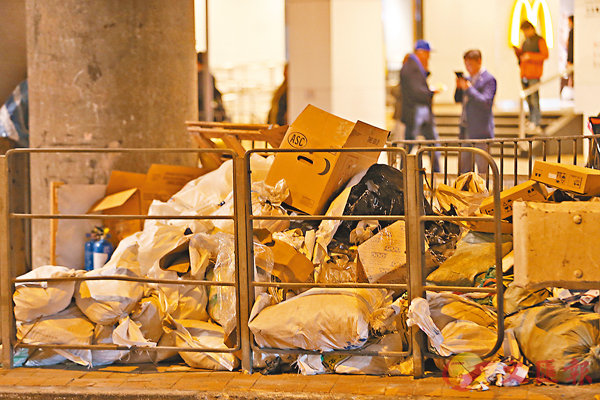 ■垃圾徵費實施後,估計一個4人家庭每月須付30元至50元。 資料圖片
■垃圾徵費實施後,估計一個4人家庭每月須付30元至50元。 資料圖片【原文】環境局3月底公佈了都市固體廢物收費(municipal solid waste charging)的建議實施安排。基於公平及「污者自付」(polluter pays)的原則,建議制定垃圾袋收費為每公升0.11港元,最快於2019年下半年在全港推行。
垃圾徵費通過經濟誘因(economic incentive),促使市民源頭減廢,值得支持。
目標減四成 增配套教育
根據環保署去年底發佈的數據(figures),在2015年,港人棄置的固體廢物總量高達每天10,159噸,即平均每人每天產生了1.39公斤的垃圾。這個數字在過去30年增長逾八成,遠超同期人口的增長(population growth)速度34%,遠較鄰近城市為高。
實施垃圾徵費,以經濟誘因提升市民減廢環保意識,是正確做法。類似政策早在首爾、台北、新加坡、東京等城市推行,效果良好。只有這樣,才能達至《香港資源循環藍圖2013-2022》提出的目標,將固體廢物人均棄置量減少四成。
當局宜從兩方面作好準備,才能落實政策。一方面是加強宣傳教育,增加回收設施。減少垃圾的最終關鍵(ultimate key)是讓市民養成將垃圾分類回收的習慣,現在距離實施垃圾徵費還有兩年多時間,政府有足夠時間加強教育和配套措施(supporting measures)。
與此同時,很多垃圾其實只要適當分類就可以變廢為寶,現階段資源回收配套不足,導致一些本來可循環再用的資源淪為垃圾,誠為可惜。政府計劃下一步將回收桶與垃圾箱的比例(recycling bin to litter container ratio )由1:14提高至1:6,肯定有助於達至減廢目標。
長者壓力尤大
另一方面,政府執法初期,難免有人會用各種方法逃避徵費,當局要嚴厲執法,打擊非法棄置(combating illegal dumping),尤其在一些老舊社區,更要加強巡查,否則少數人不守規矩(violations),將大廈走廊、後樓梯、橫街窄巷變成垃圾堆,會反過來影響公眾地方衛生。
垃圾徵費按建議的收費水平,估計一個4人家庭每月須付30元至50元,對多數家庭的生活成本壓力可以承受,但對一些生活困苦的基層家庭而言,尤其是長者,難免百上加斤。
當局在落實政策的時候,要兼顧人性化的做法,可以透過社區組織、志願團體等渠道,給有實際需要的基層家庭必要資助。 (標題及小標題為編輯所加) (摘錄自文匯報社評21-3-2017)
Solid waste charging should care for grassroots
【譯文】The Environment Bureau announced in late March the proposed implementation arrangements for municipal solid waste (MSW) charging. In line with equity and the "polluter pays" principle, the proposed per-litre charge for designated garbage bags will be set at $0.11. The charges will come into effect as early as the second half of 2019. MSW charging as a eoconmic incentive contributes to reducing waste at source, and therefore is worthy of public support.
Target: reduce by 40%
According to the figures released by the Environmental Protection Department last year, Hong Kong generated 10,159 tonnes of solid waste per day in 2015, which amounts to a daily per capita disposal rate of 1.39 kilograms. MSW has increased by over 80 per cent in the past 30 years, far outpacing the population growth of 34 per cent in the same period and is much higher than that of our neighbouring cities.
Hong Kong has made the right decision in following the footsteps of our neighbours such as Seoul, Taipei, Singapore and Tokyo, for MSW charging creates economic incentives for the public to reduce solid waste. Only in this way can we achieve the waste disposal reduction target of 40 per cent as set out in the Hong Kong: Blueprint for Sustainable Use of Resources 2013-2022.
The authorities should prepare for the implementation of MSW charging in two ways. On the one hand is to raise public awareness while increasing the number of recycling facilities. The ultimate key to reducing waste is to help our citizens to gradually develop a habit on separation and recycling of waste. As the charging scheme will only be implemented in two years from now, the government has sufficient time to step up its efforts in educating the general public and formulating supporting measures.
Meanwhile, substantial amount of recoverable value are lost as many recyclable materials are sent to the landfills due to insufficient recycling facilities. The government's plan to raise the recycling bin to litter container ratio from the current 1:14 to 1:6 will definitely help reaching the waste reduction target.
May stress the elderly
On the other hand, the government should strictly enforce the law when the charging scheme comes into effect, as it is almost inevitable that people will try to avoid the levy during its early stage. The authorities must step up its efforts in combating illegal dumping, especially in old urban areas, otherwise a few violations to the charging scheme would turn into public health issues when garbage piles up in corridors, rear staircases and public back lanes.
The proposed level of charges would cost a four-member household around HK$30 to HK$50 a month, which most households in Hong Kong can afford. But the story might not be the same for the grassroots and the senior citizens in particular. The authorities should take this into account when implementing the charging scheme and help the households in need through community organisations and voluntary groups.■Jeffrey Tse [ywc_jeffrey@hotmail.com]
Exercise
1. 轉廢為能
2. 生產者責任計劃
3. 「污者自付」
4. 都市固體廢物
5. 廢電器電子產品
Answer
1. waste-to-energy
2. Producer Responsibility Scheme
3. "polluter pays"
4. municipal solid waste (MSW)
5. waste electrical and electronic equipment (WEEE)

